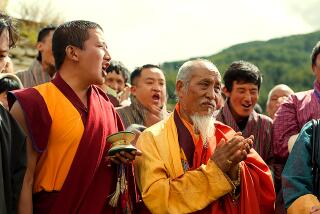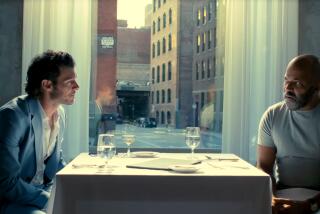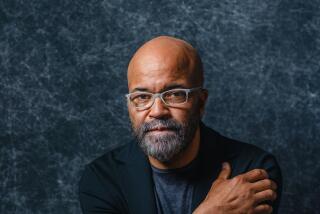‘Monk With a Camera’ filmmakers found Nicholas Vreeland ‘fascinating’
- Share via
Married filmmakers Guido Santi and Tina Mascara, whose documentary “Monk With a Camera: The Life and Journey of Nicholas Vreeland” opened Friday, needed a little spiritual intervention to convince their subject to have a movie made about his life.
Growing up in wealth and privilege, the bon vivant grandson of noted Vogue editor Diana Vreeland was a photographer by trade, known for his snappy attire and the attractive women in his life. But as a young man, he felt something was missing until he was introduced to Khyongla Rinpoche, a Tibetan Buddhist master and the spiritual teacher of His Holiness the 14th Dalai Lama. Rinpoche, who established the Tibet Center in New York City, became Vreeland’s teacher and guru.
Vreeland gave up his affluent life three decades ago, moved to India and became a monk at the Rato Monastery, the monastery of his guru.
Santi and Mascara (“Chris & Don: A Love Story”) were doing research on a novel they had optioned about Buddhist monks when they came across an article in an Indian newspaper about Vreeland, who had returned to photography to help raise money to rebuild the Rato Monastery, where he is now abbot.
“We thought it was a fascinating character study of a man who went from one life to another,” Mascara said.
The L.A.-based couple, who were living in New York at the time, found his contact information and called Vreeland to pitch him the documentary.
“I had no desire to have a film made on my life,” Vreeland said by phone from New York, where he was having an exhibition of his photos to benefit the Tibet Center.
Vreeland explained to the directors that as a “monk, one is really trying to remove one’s self from worldly indulgences and preoccupations, and having a film made would disturb that. It would be a challenge, and I didn’t wish to create challenges.”
But unbeknown to the filmmakers, Vreeland told Khyongla about the documentary.
“He said, ‘Why did you say no to them?”’ Vreeland recalled. “I told him my reasons, and he said, ‘No. It would be of value to people. You should do it.’ And so I did.”
The filmmakers had thought the project was buried, so they were a bit surprised when Vreeland invited them to shoot him at an exhibition in Naples, Italy.
“The locations made it difficult,” Mascara said. “We were living in New York at the time, and then we moved back to Los Angeles. We were following him to India three times at the drop of the hat and to Europe. So there was a lot of bouncing around.”
Despite his initial reluctance, Vreeland was comfortable in front of the camera. “He trained as a photographer and went to film school,” Mascara said.
“So he was very familiar with our process and what we were doing all the time. He knew in order to make a compelling story, you have to participate. He was always a collaborator with us in terms of showing up and answering questions. By the end of it, the trust had grown between us and him, and it was quite easy for us to ask him things.”
The documentary has interviews with friends and family, including his brother Alexander and his father, Freddy Vreeland, as well as Khyongla and the Dalai Lama.
“What I found completely fascinating about Nicky is his commitment,” Mascara said. “He follows through on everything he does in his life, from when he was a dandy selecting his clothes to now pursuing his life as a monk. It has been very interesting to see that dynamic in his personality.”
Vreeland noted he never thought that he gave up anything when he decided to follow a spiritual path.
“I still had a wonderful, privileged life that has given me confidence to take the steps that I have taken,” he said. “All of those things have remained with me. We all come from whatever our pasts are.”
Twitter: @mymackie
More to Read
Only good movies
Get the Indie Focus newsletter, Mark Olsen's weekly guide to the world of cinema.
You may occasionally receive promotional content from the Los Angeles Times.










